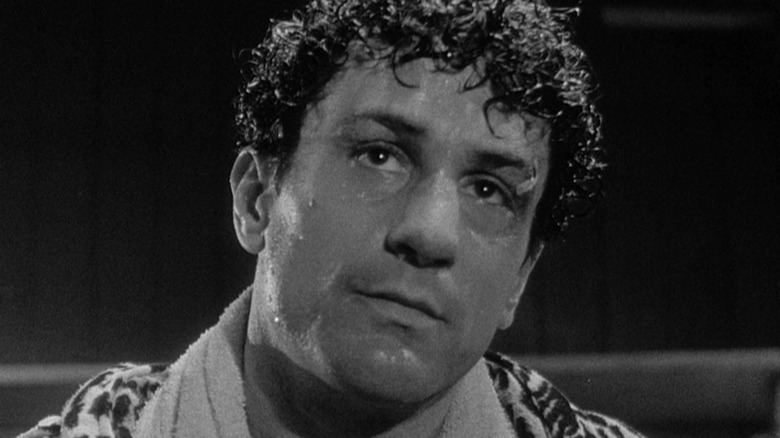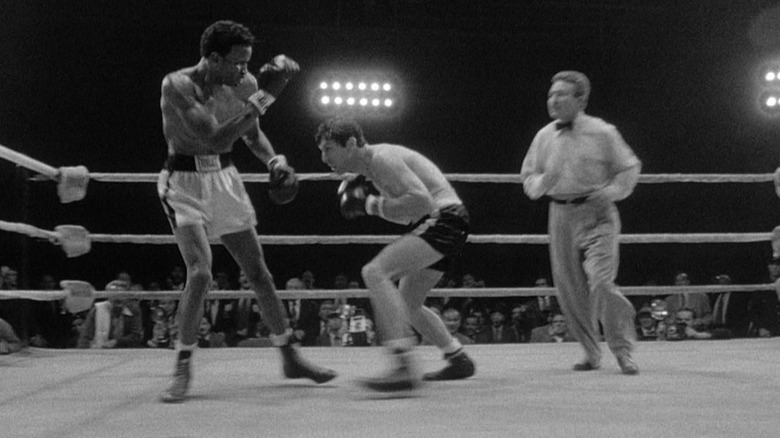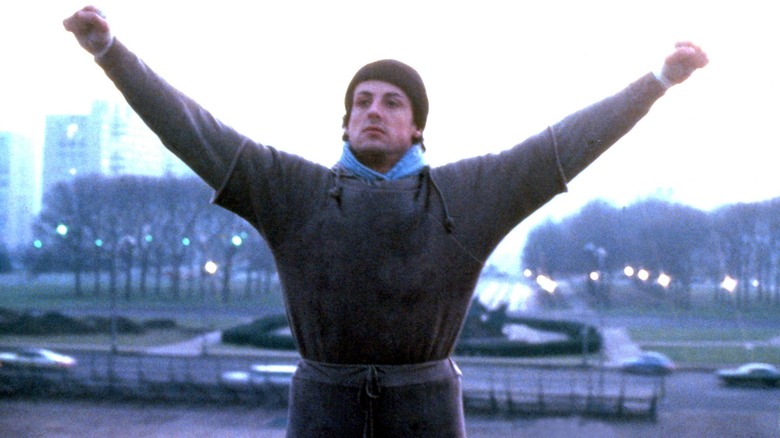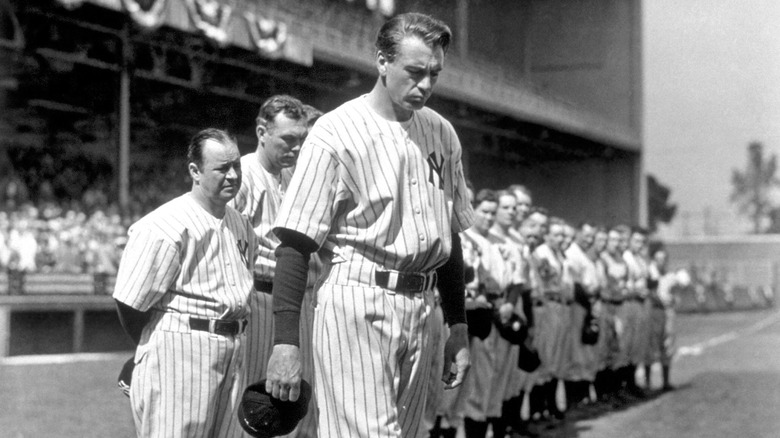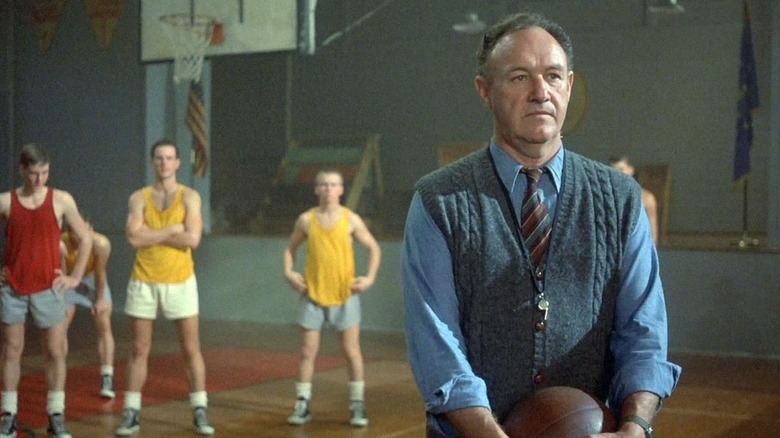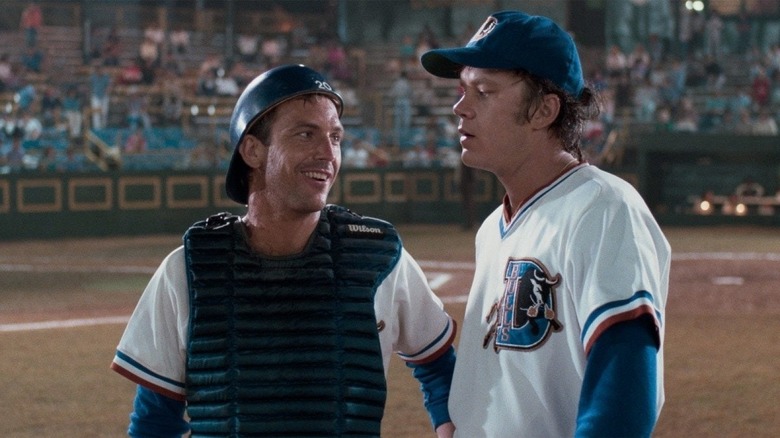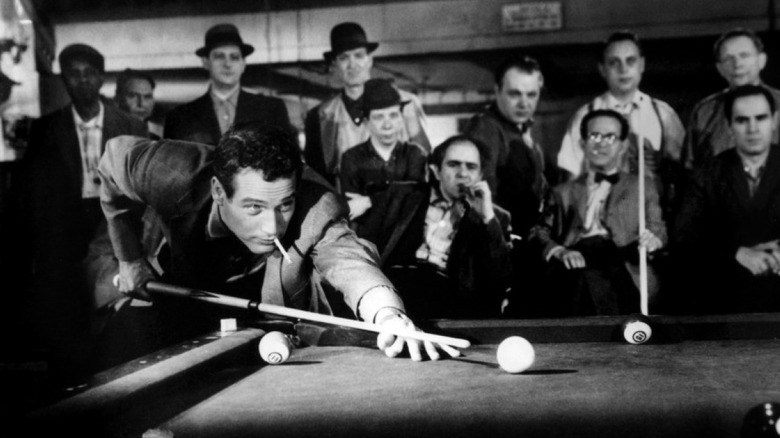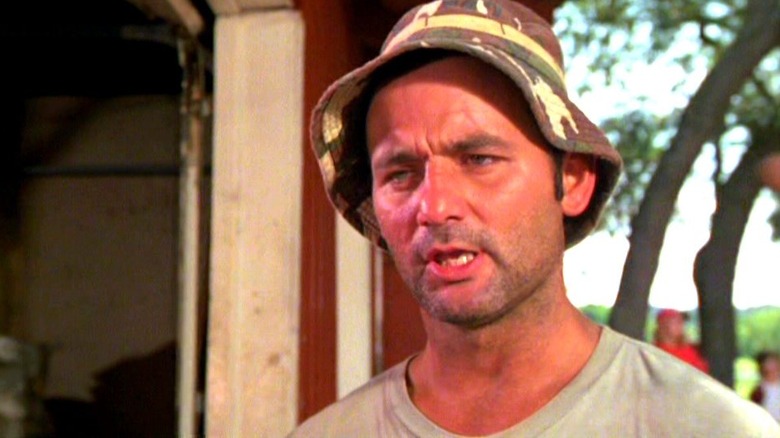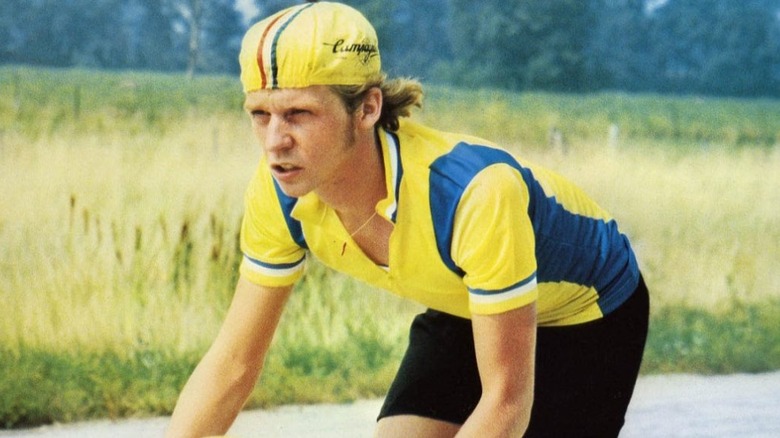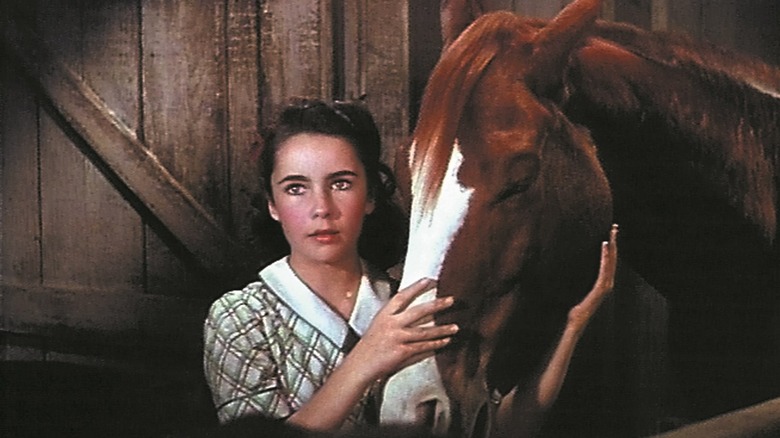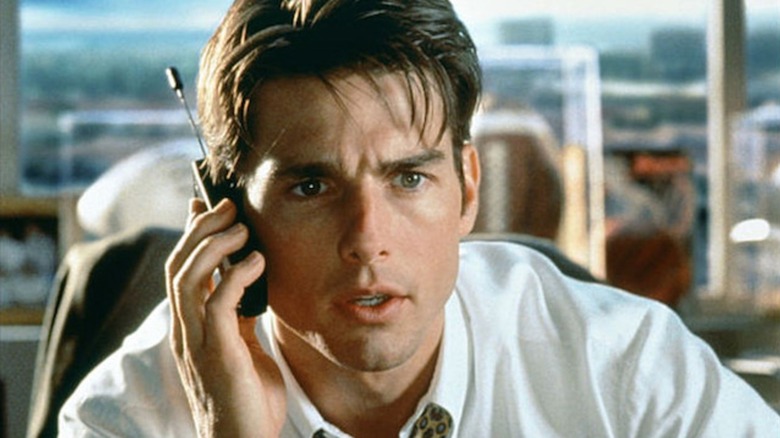The Top 10 Sports Movies According To The AFI
Starting in 1998 and ending in 2008, the American Film Institute published a series of lists of the greatest movies of all time, voted on by over 1500 film personnel, critics, and historians, to celebrate the 100th anniversary of motion pictures. For the final set of lists in 2008, they published top ten lists for ten different film genres, among them the sports movie.
Sports movie brings to mind a certain group of tropes, including grumpy coaches, inspirational speeches, and climactic victories which never really come as a surprise. Some of the movies on the AFI list are the initial instances of those cliches, while others are superior executions of them. However, many subvert or forego the cliches entirely, finding new formulas and settings to create unique stories about familiar sports. Beyond that, sports can often be tangential to what the movies are actually about, using sports as the entry point to character studies of surprising complexity. It's easy to be cynical about a genre associated with such overused story beats, but it's a genre that leaves a surprising amount of room for the right director or actors to make a big impression.
These ten sports movies have all left big impressions, fitting the AFI's criteria of initial popularity, significance in the history of film and narrative techniques, and a legacy that lasts to this day.
1. Raging Bull
Commonly placed among the best films ever made regardless of genre, Martin Scorsese's "Raging Bull" is an obvious pick for the best sports film of all time. However, it remains an unusual fit in a list full of movies with inspirational heroes and feel-good endings, as over half the films on the list also appear on AFI's list of the 100 most inspiring movies. There's no inspiration or victory over adversity in Scorsese's depiction of boxing, just brutal bursts of violence inside and outside the boxing ring.
"Raging Bull" tells the story of famed boxer Jake LaMotta, who finds his calling in boxing because of his naturally violent tendencies in life. Scorsese finds beauty in his skills inside the ring, with black-and-white cinematography and dreamy slow-motion giving the boxing scenes an otherworldly quality. But he sees no beauty in how LaMotta treats the people around him, where he applies the skills that made him a world-class boxer to bullying and attacking his friends and family.
Scorsese's direction and Robert De Niro's Oscar-winning performance as LaMotta are uncompromising in showing the ugliness of LaMotta's rage. He may seem balletic during a match, but elsewhere he hurts with no purpose or restraint. "Raging Bull" may not offer the catharsis of other movies on this list, but its effect is too powerful to ignore, showing how sports can exaggerate the worst aspects of the person competing in them.
2. Rocky
Far from the bleak vision of boxing and those who are drawn to it that "Raging Bull" depicts, the original "Rocky" is one of the great crowd-pleasers. It created one of film's most iconic underdogs, whose perseverance and triumph even in defeat continues to inspire audiences generations past the original's 1976 release. Filmmakers keep returning to the legacy of Rocky Balboa even now because the original did such a good job of making Rocky an avatar for everything that's possible if you believe in yourself. Rocky's efforts resonate to this day.
Even as many of the subsequent sequels got further away from the first movie's sense of realism, "Rocky" still retains its low-key charm, thanks in part to director John G. Avildsen's gritty but beautiful depiction of Rocky's Philadelphia stomping grounds. However, the most credit is owed to Sylvester Stallone's star-making performance and screenplay. Stallone's future career as an action star doesn't take away from the sensitivity of his first performance as Rocky, defined by a kind heart and who is motivated to fight more by his dreams more than by his muscle. It remains a touching performance, especially in the scenes between him and Talia Shire's Adrian. "Rocky"'s legendary final scene wouldn't make nearly as much of an impact if Stallone and Shire didn't have such tender chemistry throughout, and the ensuing franchise is built on the back of Rocky and Adrian more than it is the actual boxing.
3. The Pride of the Yankees
Major League Baseball has been the subject of many classic movies, including "The Natural" and "Eight Men Out." But the only movie on the AFI list representing the MLB is "The Pride of the Yankees," a 1942 film that celebrates one of the most beloved figures in baseball history. Even viewed now, when fewer people are aware of the accomplishments of its subject, it's still a stirring tribute to a great man lost much too soon, the embodiment of all that's noble about baseball.
"The Pride of the Yankees" tells the story of Lou Gehrig, a first baseman for the Yankees who lost his life to ALS, the disease that would later be called Lou Gehrig's disease. Gehrig had died only the year before the film came out, and several of Gehrig's teammates and friends play themselves in it, including fellow Yankee Babe Ruth. Gary Cooper plays Gehrig himself as not just a skilled baseball player but a person of uncommon decency, showing how much was lost for both humanity and baseball when he died.
The film's loving portrayal of Gehrig leads to one of the most famous speeches in film history, where Gehrig considers himself "the luckiest man on the face of the Earth." It was adapted from Gehrig's real-life farewell speech, giving Gehrig's heartfelt words the cinematic immortality they deserve.
4. Hoosiers
The team of director David Anspaugh and writer Angelo Pizzo is responsible for two of the most beloved sports movies of all time. One is "Rudy," the other is "Hoosiers." While both are superior examples of the inspirational sports genre, "Hoosiers" comes out ahead on the back of its terrific cast, who give its traditional underdog story more depth and heart than it would otherwise have.
Based loosely on the true story of Milan High School, a small-town Indiana basketball team that became state champions in 1954, "Hoosiers" mostly sticks to tried-and-true sports movie formulas about come-from-behind victories and coaches with hearts of gold. Even if they're cliches, they're cliches executed surprisingly well with just the right people. It doesn't matter that they've been done before, only that they work almost flawlessly as they're executed here. There are plenty of tough but inspiring movie coaches, but not many are played by actors as good as Gene Hackman, who can play convincingly tough while conveying depths of feeling and pathos not written in the script. The same goes for Dennis Hopper, who got an Oscar nomination for his performance as the team's alcoholic assistant coach. It's as much fun to watch two all-time great actors working together as it is to watch the team overcome the odds and succeed.
5. Bull Durham
Before becoming a writer and director, Ron Shelton began his career as a minor league baseball player. His experiences in the minors helped to shape the screenplay of his directorial debut "Bull Durham," about a veteran minor-league catcher, Lawrence "Crash" Davis (Kevin Costner), in love. The specificity of Shelton's insider knowledge on the minors helped make "Bull Durham" a critically acclaimed hit, with Shelton getting an Oscar nomination for its screenplay. Shelton made several sports movies after "Bull Durham," including a reunion with Costner on "Tin Cup," but none of them can equal his connection to this kind of baseball.
Shelton's view of the minor leagues is both loving and irreverent, finding comedy in the outrageous personalities of the players not yet ready to make the jump to the majors. This was an early breakthrough for Tim Robbins, who gets the movie's biggest laughs as a minors player whose undeniable skill is balanced by his total immaturity.
Funny as it is, "Bull Durham" is first and foremost a romance, not just between Crash and Susan Sarandon's "baseball groupie" Annie, but between Crash and the sport he loves to play. Even without the frills of the major leagues, baseball still has magic to it, and Costner communicates clearly that Crash loves every second he spends playing it. Baseball wears on Crash like any job, but it's a job he loves more than anything else.
6. The Hustler
Compared to the spectator and team games portrayed in the other films on this list, pool is an intimate sport, with a sharp focus on two people going head-to-head at a small table. The more personal nature of the sport is portrayed in the only pool movie on the AFI list, Robert Rossen's "The Hustler." There, pool becomes a battleground between the cockiness of youth and the hard-fought battles of adulthood, where greatness requires a brutal kind of growing up.
While Paul Newman's career spanned decades and numerous classic films, no role defined him like his character in "The Hustler," "Fast Eddie" Felson. Newman would later win his only Oscar for reprising Fast Eddie in "The Color of Money," but his original performance in the part is definitive, capturing Newman at the peak of his youthful charm. Fast Eddie has the talent and charisma to become a great pool player, but he's drawn to small-time hustling rather than competitive greatness, getting himself into trouble when he could be making a name for himself. By the time he's finally ready to compete against pool great Minnesota Fats (Jackie Gleason), Eddie has suffered so much that he's learned the hard way about the discipline it takes to excel in the sport.
Like "Raging Bull," this is not a pretty movie, as it depicts a man giving up everything in his life to become a great athlete. Even the victories seem hollow in light of what Eddie experiences to accomplish them.
7. Caddyshack
In real life, the sport of golf is a quiet, restrained affair. But the AFI associates golf with the raucous comedy of "Caddyshack," which sees the respectful conventions of golf and rejects them in favor of anarchy. "Caddyshack" remains one of the great snobs vs. slobs comedies, forever changing the way people see golf courses and country clubs.
The culture around golf is an ideal comedic target, with country clubs restricting membership mostly to old money families. "Caddyshack" takes aim at the richest and snobbiest of the country club set, setting Ted Knight's smug club founder against average caddies and Rodney Dangerfield's loudmouthed new money golfer. But ultimately, "Caddyshack" is remembered less for its plot and more for its slapstick set pieces, including the famous scene of a Baby Ruth in a swimming pool, and oft-quoted dialogue.
That dialogue is funny as written but it really comes to life when acted out by this movie's collection of comedy greats, all of whom would go on to be some of the biggest movie stars of the 1980s. Even with Dangerfield and Chevy Chase both doing some of their best work, the most legendary performance of the bunch is Bill Murray as groundskeeper Carl Spackler, whose violent war with a gopher gave the movie its defining image. Murray's incoherent mumbling even earned a spot in the AFI's list of the 100 best movie quotes.
8. Breaking Away
Cycling is one of the most underrepresented sports in American film, covered mainly by movies about Lance Armstrong and other professional cyclists. The cyclists at the center of "Breaking Away," the only cycling movie to make the AFI list, aren't competing in the Tour De France or any professional race, but they have a will to succeed far greater than the small size of the competition.
"Breaking Away" tells the story of a group of Indiana teenagers entering adulthood by competing in local bicycle races. The cycling scenes are excellent, with director Peter Yates' background in action techniques ensuring that the races are exciting and well-filmed. But the biggest strength of "Breaking Away" is Steve Tesich's Oscar-winning screenplay, which fleshes out every character with so much detail and personality that the sports element is almost unnecessary, these are interesting enough people to follow without the promise of a climactic bicycle race.
After all, the cyclists are a terrific group of some of 1979's best young actors, led by Dennis Christopher's Golden Globe-nominated performance and featuring early roles for Dennis Quaid, Daniel Stern, and Jackie Earle Haley. Even the supporting characters make big impressions, with Paul Dooley and an Oscar-nominated Barbara Barrie giving lovable performances as Christopher's parents. It's a pleasure to get to know these people and to see them triumph by the end.
9. National Velvet
The legacy of the 1944 horse-racing drama "National Velvet" is tied to the actress it helped make a star. Elizabeth Taylor was only 12 years old when she starred in "National Velvet," which won her acclaim and began her decades-long career as one of Hollywood's brightest and most publicized stars. Without Taylor, "Velvet" is merely a solid sports movie, but with her, it's a classic.
Taylor stars as Velvet Brown, a young British girl who decides to enter her beloved horse in the Grand National horse race. Taylor's costar, and the movie's big star at the time of its release, was Mickey Rooney, who plays the former jockey enlisted to train Velvet's horse for the race, but Taylor is the obvious standout of the two. She avoids the cloying cuteness of so many child actors then and now while also not playing the part like a little adult, making her come off as adorable in an unforced way.
"National Velvet" casts similarly gifted actors to play Taylor's family, with a young Angela Lansbury, in only her second screen appearance, as her sister and an Oscar-winning Anne Revere as her mother. The strength of their family dynamic is enough to distract from the more predictable elements of "National Velvet," it shows what the right actors can do with material that doesn't seem like much on the page.
10. Jerry Maguire
The AFI classifies the sports genre as "films with protagonists who play athletics or other games of competition." By this definition, it's a bit of a stretch to call "Jerry Maguire" a sports movie since its protagonist is not the one playing sports. But whether or not Jerry Maguire himself plays football, the film bearing the character's name is still one of the best movies made about sports, shining a light on an underdiscussed but crucial aspect of professional athletics.
There is some traditional sports action in "Jerry Maguire," led by Cuba Gooding Jr.'s Oscar-winning performance as the brash football player who Maguire takes under his wing. However, more often, rather than rehash what other sports movies have done, "Jerry Maguire" finds a unique angle by focusing on the agents working behind the scenes to secure and market the top athletes. Contracts must be signed and sponsorship deals must be arranged if a player wants to make an impact on the public, and it's up to the agent, in this case, Tom Cruise's Maguire, to get those things done. It's work that's invisible to the public but hard work nonetheless, and writer/director Cameron Crowe manages to make the ins and outs of contracts as exciting as any football game.
While the romance between Cruise and Renee Zellweger is "Maguire"'s main focus, it's fascinating just as a look at the desperate maneuvering it takes to keep professional sports running.
